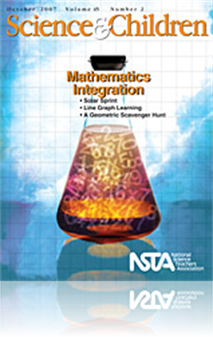All Science and Children resources
Journal Article
Methods and Strategies: Developing Investigative Skills Purposefully
Members of a team of educators and university students participating in the project, Pittsburgh Partnership for Energizing Science in Urban Schools, addressed the issue of helping students develop investigative skills within the context of an introdu...
Journal Article
Every Day Science Calendar—November 2007
This monthly feature contains facts and challenges for the science explorer. ...
Journal Article
Teaching Through Trade Books: Words to the Wild
A notebook is perhaps the single most important piece of equipment a naturalist takes into the field. But notebooks are not only for use by field scientists: They are also excellent tools for helping students record observations outdoors, develop com...
Journal Article
Thomas Locker’s book about nature entitled Water Dance (1997) provides the basis for this interdisciplinary project on Earth’s water cycles. Through thoughtful consideration of the text and art in Water Dance, students build and express deep...
Journal Article
Peering through a thematic science lens—elementary students embarked on a one-week study of ants during a month-long summer school program. This integrated unit addressed reading and writing skills while developing the science-process skills of obs...
Journal Article
Science 101: How is reading science books different from reading other kinds of books?
A good history book tells a story, much like a good novel. In reading those stories, one is able to read through the text relatively quickly and still get the main points. Science reading is a much slower process. You read science texts to understand...
Journal Article
Reinvigorating Science Journals
Science-themed books are wonderful tools for emphasizing the importance of observation and journaling. They can also be used to effectively promote literacy skills in science. This article shares a selection of nature books and the ways teachers and ...
Journal Article
Children possess a genuine curiosity for exploring the natural world around them. One third grade teacher capitalized on this inherent trait by leading her students on “A Geometric Scavenger Hunt.” The four-lesson inquiry investigation described ...
Journal Article
Collecting data and analyzing the results of experiments is difficult for children. The authors found a surprising way to help their third graders make graphs and draw conclusions from their data: digital photographs. The pictures bridged the gap bet...



